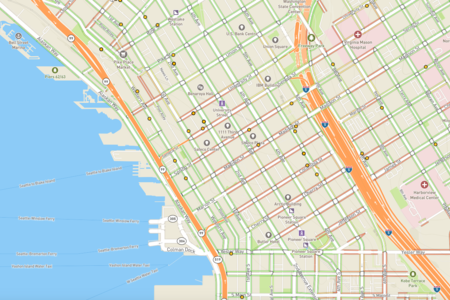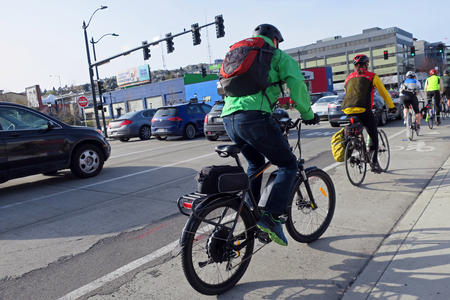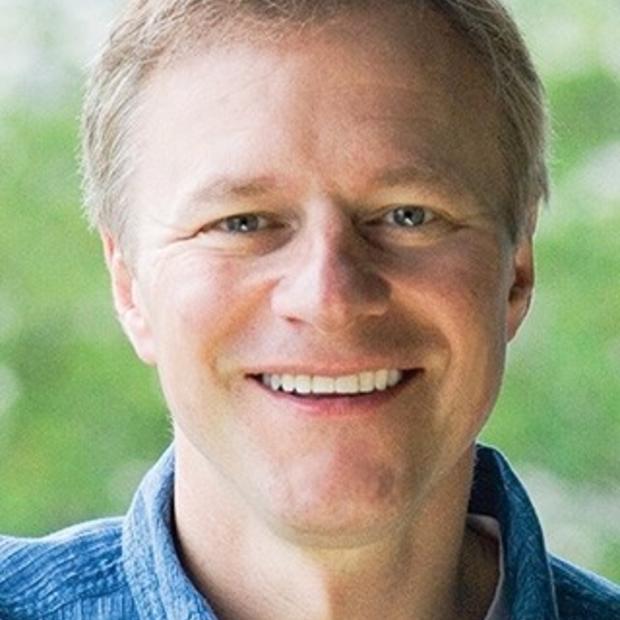Transportation is one of those rare issues where people seem to make up their minds by what they see and experience daily, rather than what they hear from friends or read about in the media.
The countywide poll, separating city and suburban sentiment, found remarkable synthesis between people on both sides of Lake Washington. Toll freeway lanes? Bad idea, said 61 percent of suburban folks. As did 56 percent of Seattleites.
How about charging a toll to drive into Seattle? What a dumb idea, said 70 percent of city residents. Boy, I’ll say, agreed 71 percent of suburban dwellers.
What about allowing developers to build apartment buildings with no parking to encourage people to take transit? As a Bellevue city planning commissioner, I’ve seen builders and city bureaucrats build alliances to try and lower parking requirements to cut the developer’s costs while making it more onerous to drive. Partly owing to the results from Seattle’s lack of parking requirements for apartments, we always say no.
And so do the people in both the suburbs and the city. A full 73 percent of Seattle residents oppose the idea (47 percent “strongly”) while only 23 percent support it (7 percent “strongly”). In the ’burbs, opposition ran even higher, 79 percent, with 50 percent “strongly” opposed it.
It seems that the transportation establishment in King County (Metro, Sound Transit and the Seattle Department of Transportation) reached one conclusion. And most people in King County — whether in ardently liberal Seattle, less overwhelmingly liberal edge cities like Kirkland, or more moderate and distant suburbs like Woodinville and Kent — reach another.
Reason? Residents in King County are guided by the evidence. Transportation agencies in King County are governed by anti-auto ideology. So there were bound to be different outcomes. Ideologues are impervious to evidence.
The issue that best illustrates this point is Seattle’s forced love affair with bicycles. The city advertises itself as one of America’s premier pro-bike destinations. And on paper it ought to be. Lots and lots of young people. Plenty of environmentally aware residents. No shortage of folks looking for low-cost alternatives to buying and maintaining a car. And have you checked out the cost of parking?
So enthusiastic is city government about bicycles that it once owned a bike-share company (an expensive lesson in what government shouldn’t do). A former mayor was nicknamed “Mayor McSchwinn.”
But the Times/Elway poll shows a chilled relationship with bikes. When asked if they favor or oppose the development of more bicycle lanes, only 40 percent of city residents support it, while 56 percent oppose it — virtually the same ratio of opposition as in the suburbs. In fact, on the intensity scale, slightly more city residents “strongly” oppose more bike lanes, 29 percent in Seattle to 28 percent in suburbia. Even more revealing is that only half as many Seattle residents — 14 percent — say they strongly favor more bike lanes in Seattle.
But building more bike lanes is what departing-before-he’s-swept-aside Seattle City Councilmember Rob Johnson and embattled incumbent Mike O’Brien are pushing as a top priority in transportation.
Because of public demand? Hardly. Despite almost evangelistic fervor for bike lanes among the small, but vocal and impressively organized activist groups and the kindred spirits in SDOT, bicycling in Seattle (for commuting, not recreation) has dropped by more than 25 percent in two years from 4 percent to 2.8 percent. So did the absolute number of bicycle commuters. Declining enthusiasm for more bike lanes in the Times/Elway poll reflects the falling interest in bike commuting.
These numbers completely contradict the conventional wisdom about biking in Seattle. Never has it been easier than it is today for more people at more times in more places to find a bike and ride it — whether they own one or not. And yet the numbers for bike commuting aren’t rising.
Here is the dirty little secret why: Too many hills and too much rain. It was that way when Seattle was a blue-collar town. It was that way during the “Seattle nice” ’70s and ’80s. It was that way during the grunge era ’90s, and it’s that way today. An increase in bike lanes or a creative marketing campaign won’t change that simple, fundamental reality.
For recreation, sure, bike riding is fun. And it’s a great way to work out, though growing numbers of people find it safer, easier and increasingly convenient to do it on machines indoors. But for commuting or large-scale tourist travel, there will never be large numbers of bicyclists.
We are not Copenhagen. We never will be.
And it’s not for lack of trying. Bicycling magazine named Seattle the best bike city in America in October, an acknowledgement of the work done by bike enthusiasts in and out of government since the 1970s. The guiding belief on bike lanes was, “If you build them, people will pedal.” But look at the growing number of transit options — bus, rail, public and private van pools — or telecommuting from home. Or walking, where you can at least carry an umbrella. And Uber.
For what it’s worth, the decline in bicycle commuting is happening across America. According to the Census Bureau, between 2016 and 2017, it’s down by nearly 20 percent in San Francisco, 24 percent in Austin, and more than 12 percent in Boston.
More bike lanes aren’t going to lift those numbers any more than the additional bike lanes in the past five years have. When bicycles aren’t fun to ride, most people, even those who own and like bikes, won’t ride them. And riding in clogged urban traffic isn’t fun.
Especially in a city with too many hills and too much rain.









